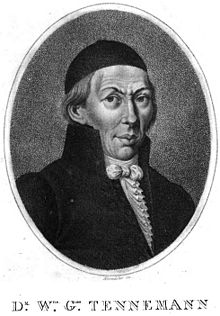Alberto Vanzo writes…
Wilhelm Gottlieb Tennemann was a very influential Kantian historian of philosophy. His textbook on the history of philosophy had five German editions. Its two English translations were reprinted throughout the nineteenth century. As a result, many of Tennemann’s judgements and historiographical classifications ended up being accepted, more or less consciously, by generations of students, philosophers, and historians.
One of Tennemann’s classifications that became standard is the distinction of most early modern philosophers into empiricists and rationalists (RED). Tennemann’s lists of early modern empiricists and rationalists are now standard. His reading of Hume as bringing Locke’s empiricism to its sceptical consequences, or of Kant as synthesizing empiricism and rationalism, are still widely accepted.
At the basis of Tennemann’ historiography is an outlook that few, if any, would agree with today. Tennemann asks: what should the history of philosophy be, over and above the history of ideas? He answers:
 History of Philosophy […] can be neither history of philosophers, nor history of ideas [Philosopheme]. It includes both, but it subordinates them to a higher purpose and point of view. This is the exposition of the formation and development of philosophy as science.
History of Philosophy […] can be neither history of philosophers, nor history of ideas [Philosopheme]. It includes both, but it subordinates them to a higher purpose and point of view. This is the exposition of the formation and development of philosophy as science.According to Tennemann, Kant laid the foundations for philosophy as science. Thanks to the Kantian revolution, we know the one true philosophy.
Kant did not create this true philosophy ex nihilo. Kantian philosophy is the crowning of endless attempts to develop a true science. It is the synthesis of the best insights of Kant’s predecessors. According to Tennemann, historians of philosophy should trace the gradual development of those insights from ancient Greece to their Kantian epilogue.
This Kantian stance has several interesting consequences. Let me focus on two of them.
1. Kant’s philosophy sharply distinguishes a priori questions belonging to metaphysics and (what we now call) epistemology from the empirical inquiries of natural science. It focuses on the former and leaves the latter to (what we now call) working scientists. Consistent with his intent to trace the ancestry of philosophy in the Kantian sense, Tennemann makes only passing remarks on the development of natural philosophy. He repeats several times that Descartes was mainly interested in natural philosophy. However, Tennemann’s Descartes comes across as the “philosopher of pure inquiry” because, for Tennemann, “pure inquiry” was the truly philosophical part of his thought – philosophical in Kant’s sense of the term.
2. A history of early modern philosophy can be organized on the basis of various criteria: chronological and geographical factors, actor categories like experimental philosophy, or later notions like those of empiricism and rationalism. What criteria are the best? Tennemann answers as follows. History of philosophy should describe reason’s progress towards Kantian philosophy. To this end, it is best to group early modern authors on the basis of their views on two typically Kantian themes: whether there are non-empirical concepts and whether we can have substantive a priori knowledge. The results of these groupings are Tennemann’s accounts of the evolution of empiricism and rationalism, converging in Kant’s final synthesis.
Tennemann is conscious that the results of this choice are somewhat arbitrary. While he places Berkeley between Locke and Hume in his parade of empiricist philosophers, he acknowledges that Berkeley was also influenced by the rationalists Descartes and Malebranche.
Since the early 1980s, the fact that Descartes was more interested in natural philosophy than in “pure inquiry”, or the affinities between Berkeley and Malebranche, are adduced to claim that the narratives of early modern philosophy based on the RED are broken-backed. Tennemann, probably the first historian to develop such a narrative in detail, openly acknowledged those facts. Yet he based his historiography on the RED nevertheless. This is because that distinction was the most functional to his views on what philosophy is and what its history should accomplish.
Tennemann’s case teaches us that no amount of detailed historical excavations or textual analyses will suffice to tell us whether we should accept the RED, reform it, or replace it with some other master narrative of early modern philosophy. To make such a choice, we should have clear ideas on what we should identify this philosophy that we are studying with, and on what we take our tasks as historians of philosophy to be. Tennemann gave fully explicit answers and he was coherent with them in developing a historiography based on the RED. How should we answer those questions?

